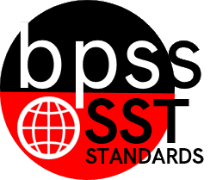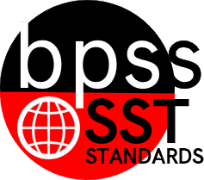SST-07.4
 Standard 4: Standard 4:
Government and Citizenship
Students understand the development, functions, and forms of various political institutions and the role of the citizen in government and society.
|
Narrative for the Government and Citizenship
In the future this will contain narratives and other information about the Standard.
Calculation Method for Standards
Standards are larger groups of related benchmarks. The Standard Grade is a calculation of all the related benchmarks. Click on the benchmark name below each Standard to access the learning targets and proficiency rubrics for each standard's related benchmarks. |
|
SST-07.4.01
|
7th Grade SST Targeted Benchmarks
Standard 4: Political Systems
SST-07.4.01 Compare the rights and responsibilities of citizens from a variety of countries (e.g. United States, Indonesia, Iran, Australia, India, China, Germany, Poland, Brazil, Ghana).
|
Student Learning Targets:
Knowledge Targets
- I can explain the rights of Cuban citizens.
Reasoning Targets
- I can compare and contrast the rights and responsibilities of being a citizen of the US, Cuba, and Puerto Rico.
Proficiency Scale
| Score |
|
Description |
Sample Activity
|
| 4.0 |
In addition to Score 3.0, the student demonstrates in-depth inferences and applications regarding more complex material that go beyond end of instruction expectations. |
- |
| |
3.5 |
In addition to Score 3.0 performance, the student demonstrates in-depth inferences and applications regarding the more complex content with partial success. |
| 3.0 |
“The Standard.” The student demonstrates no major errors or omissions regarding any of the information and processes that were end of instruction expectations. |
- |
| |
2.5 |
The student demonstrates no major errors or omissions regarding the simpler details and processes (Score 2.0 content) and partial knowledge of the more complex ideas and processes (Score 3.0 content). |
| 2.0 |
The student demonstrates no major errors or omissions regarding the simpler details and processes but exhibits major errors or omissions regarding the more complex ideas and processes (Score 3.0 content). |
- |
| |
1.5 |
The student demonstrates partial knowledge of the simpler details and processes (Score 2.0 content) but exhibits major errors or omissions regarding the more complex ideas and procedures (Score 3.0 content). |
| 1.0 |
With help, the student demonstrates a partial understanding of some of the simpler details and processes (Score 2.0 content) and some of the more complex ideas and processes (Score 3.0 content). |
- |
| |
0.5 |
With help, the student demonstrates a partial understanding of some of the simpler details and processes (Score 2.0 content) but not the more complex ideas and processes (Score 3.0 content). |
| 0.0 |
Even with help, the student demonstrates no understanding or skill. |
- |
Resources
Websites
Vocabulary |
|
SST-07.4.02
|
7th Grade SST Targeted Benchmarks
Standard 4: Political Systems
SST-07.4.02 Explain how people create and change structures of power (e.g., force, elections, wars, reactions to economic conditions and natural disasters).
|
Student Learning Targets:
Reasoning Targets
- I can explain the relationship and conflicts among the North American countries.
- I can explain the rights and responsibilities of being a citizen in different North American countries (e.g. Cuba, America, Canada, etc.).
Proficiency Scale
| Score |
|
Description |
Sample Activity
|
| 4.0 |
In addition to Score 3.0, the student demonstrates in-depth inferences and applications regarding more complex material that go beyond end of instruction expectations.
Hypothesize how an economic crisis in one North American country would affect the other countries. |
- |
| |
3.5 |
In addition to Score 3.0 performance, the student demonstrates in-depth inferences and applications regarding the more complex content with partial success. |
| 3.0 |
“The Standard.” The student demonstrates no major errors or omissions regarding any of the information and processes that were end of instruction expectations.
The student:
- compares and contrasts commonwealth, state, and independent country.
- analyzes the pros and cons of commonwealths, states, independent countries.
|
|
| |
2.5 |
The student demonstrates no major errors or omissions regarding the simpler details and processes (Score 2.0 content) and partial knowledge of the more complex ideas and processes (Score 3.0 content). |
| 2.0 |
The student demonstrates no major errors or omissions regarding the simpler details and processes but exhibits major errors or omissions regarding the more complex ideas and processes (Score 3.0 content) as the student:
-
recognizes or recalls specific terminology, such as:
- NAFTA, communism, dictator, exile, interdependent, province, territory, imports, exports, etc.
-
performs basic processes, such as:
|
-
When given a term, identify the correct definition.
-
Identify leaders when given their country.
-
When given a government type, identify the roles of the citizens.
|
| |
1.5 |
The student demonstrates partial knowledge of the simpler details and processes (Score 2.0 content) but exhibits major errors or omissions regarding the more complex ideas and procedures (Score 3.0 content). |
| 1.0 |
With help, the student demonstrates a partial understanding of some of the simpler details and processes (Score 2.0 content) and some of the more complex ideas and processes (Score 3.0 content). |
- |
| |
0.5 |
With help, the student demonstrates a partial understanding of some of the simpler details and processes (Score 2.0 content) but not the more complex ideas and processes (Score 3.0 content). |
Resources
Websites
Vocabulary |
|
 BPS District Social Studies Standards Book
BPS District Social Studies Standards Book

 Standard 4:
Standard 4: